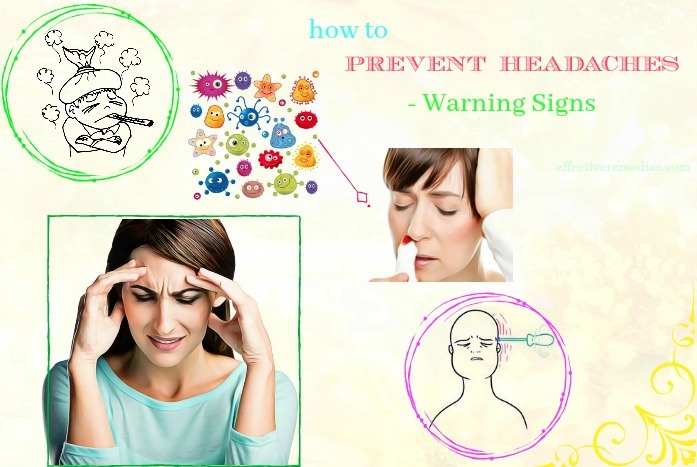Updated: 11/14/2019
Contents
Overview
Almost everyone has experienced a headache, and it they occur in almost all age groups. It can really affect productivity due to prolonged or severe pain. If you are a headache sufferer, you needn’t worry because there are many useful ways on how to prevent headaches at work. Read this article on Effective Remedies to find the best headache busting tips.
10 Easy Ways On How To Prevent Headaches At Work Caused By Weather
I. What Is A Headache?
A headache is pain originating from the head or neck of your body. The pain arises from the structures and tissues surrounding the skull or brain. The layer of tissue surrounding bones, muscles encasing the skull, sinuses, ears, and eyes, and tissues covering the surface of your brain and spinal cord, arteries, nerves, and veins, can get irritated or inflamed and cause a headache. The pain can be a dull ache, throbbing, constant, sharp, intermittent, intense, or mild.
II. Causes Of Headaches
A migraine headache:
- Irritation or inflammation of structures that surround your brain or impact its function
- Systemic illnesses such as infection or dehydration
- Changes in blood flow and circulation or trauma
- Changes in brain chemistry: medication reactions, drug withdrawal, and drug abuse
A tension headache:
Tension headaches are the most common type of headaches, but their cause is unknown. The most likely reason is the contraction of the muscles covering the skull. When these muscles are stressed, they get inflamed, spasm, and cause pain.
EffectiveRemedies Partner Solutions

Ask a Doctor Online and Get Answers in Minutes, Anytime!
Have medical questions? Keep asking questions to a Verified Expert until you get the answer you need.
Tension headaches occur due to stress on the muscles of your head. Physical stressors include prolonged manual labor, sitting in front of a computer for long periods, or sitting at a desk. Also, emotional stress can be a cause of tension headaches because it causes the muscles around the skull to contract.
Other causes:
- Pressure from work, life, and relationships
- Using many stimulants such as alcohol, beer, cigarettes
- Sensory overload:-exposure to lights that are too bright, sounds that are too loud, and the smells that are overpowering
- Dehydration (not drinking enough water)
- Too much sleep or not enough sleep
- Hormonal changes
III. Warning Signs
Mild headache symptoms do not need immediate medical attention. Symptoms include: dull, aching head pain, a sensation of pressure across the forehead or on the back or sides of the head, pain in shoulder, neck, and scalp muscles.
If you have any signs of the following, its best to go to the hospital immediately and get advice and treatment from the doctor. Here are some warning signs you need to know.
- Your headache is explosive and violent or sudden.
- You have a headache, but this time it feels like the worst you've ever experienced.
- A change in vision, imbalance, and memory loss.
- After 24 hours the pain has not decreased.
- You have a weakened immune system due to some diseases.
- You have fever and nausea following a headache.
IV. Why Should You Prevent It?
Headaches are common, and they usually do not represent a serious illness. However, if you don’t prevent it, it will affect some aspects of your life. Moreover, if pain continues or happens frequently, it can become a serious disease. Here are some negative effects that headaches bring:
- Disrupt daily activities
- Affect work productivity
- Feeling fatigued
V. How To Prevent Headaches Naturally At Home
1. How To Prevent Headaches – Don't Skip A Meal
Fluctuations in blood sugar can be the root cause of chronic or acute headaches. Consult a doctor if you suspect an issue with blood sugar irregularity. You may benefit from eating smaller, more frequent meals.
2. How To Prevent Headaches – Exercise Regularly
As you may know, regular exercise plays an important role in a healthy lifestyle. However, intense exercise, including weightlifting, can trigger a headache. You should pay attention to the response of your body to certain activities. You should also adopt activities that aid in easing stress without causing too much strain on your body, such as light tai chi or aerobics. During the times you are free from a headache; regular exercise may be an excellent way to help you keep headaches at bay. According to a study, migraine patients suffered from fewer and less intense headaches after they followed a regular cycling routine[1]. Moreover, yoga can also aid in preventing a headache, although you should be careful with hot yoga classes because the high temperatures may increase intracranial blood flow and trigger a headache.
3. How To Prevent Headaches – Avoid Food Triggers
People who experience migraines should avoid certain foods, such as aged cheese or meats cured with preservatives.Doctors often encourage patients to consider their dietary choices and look for patterns that can cause a headache. If you suspect some foods cause your headaches, try avoiding them.
4. How To Prevent Headaches – Avoid Highly Stimulating Situations
Loud noise, strong perfumes, busy patterns, watching an action movie, may be common triggers of migraines for some people. Therefore, you should try to avoid these highly stimulating situations as much as possible. However, according to a 2013 study in the Journal of American Academy of Neurology, some common triggers may not be as strong as patients with migraines think they are[2]. When migraine sufferers exercised vigorously for one hour and were exposed to flickering light or bright light, only 22% reported migraines.
5. How To Prevent Headaches – Pay Attention To Hormonal Changes
Hormones have a significant impact on migraines and headaches. Many women tend to suffer from more migraines during or before their menstrual cycle. Women should pay special attention to their exercise habits and daily diet during this time. Eating healthy and exercising regularly will help prevent symptoms before they begin. The Mayo Clinic noted that hormone replacement therapy and oral contraceptives increased the severity and frequency of migraines in a portion of women[3]. Some women choose to switch to another type of birth control to find relief from migraines, while many others suffer from fewer migraines when taking birth control.
6. Eat Fruits And Vegetable With High Water Content
Our body needs energy to enjoy many activities of daily living, and this energy comes from food. It is important that you should eat regularly to ensure your body gets the energy it needs to perform optimally. Eating regularly will help you avoid some diseases and headaches as well.
- Drink plenty of water to replenish your body fluids
- Pick low fat food
- Choose fruits and vegetables containing lots of water since headaches can be caused by dehydration.
- Fruits containing a lot of water include: watermelon, cucumber, mushrooms, cherries, bananas, and strawberries.
7. How To Prevent Headaches – Manage Stress
Stress can lead to increases in blood pressure which in turn can trigger a headache. Some effective stress management techniques are:
- Take part in regular social activities to help the brain relax.
- Make yourself comfortable.
- Do some deep breathing when you feel stress creeping in.
8. How To Prevent Headaches – Sleep Well
Sleep plays a critical role in the immune function, learning, and resetting the body after a hard working day.
- Pay attention to sleeping time
- Get enough sleep
9. How To Prevent Headaches – Improve The Posture
Posture can have an effect on muscle tension, stress and blood flow. These can all have an effect of headache intensity and frequency. You should therefore do the following:
- Make the right posture when working or studying. (consult a physiotherapist or occupational therapist)
- Move around every 30 minutes and avoid sitting for prolonged periods of time
10. How To Prevent Headaches – Consider Vitamins
According to some studies, certain supplements and vitamins may help to prevent recurring headaches[4]. In a study in the Journal of Neurology, daily doses of Petasites hybridus root (butterbur) help to cut the frequency of migraines in half. Similar results were also found for riboflavin AKA vitamin B2[5]. Coenzyme Q10 (a vitamin in seafood and meats), and the mineral magnesium also aid in decreasing the frequency of headaches. However, before taking any supplement, consult your doctor to make sure that it is safe for your situation.
VI. What To Do If You Have It?
If you have a headache, you can do the following:
First, you should assess your pain level to treat it appropriately. If it is too painful, or it is a persistent pain, you should go to the hospital immediately. If it is only mildly painful, you may want to adjust your daily activities in accordance with the previously mentioned lifestyle tips for headache treatment and prevention.
In this article we presented some easy tips on how to prevent headaches at work that you should try applying in your daily routine. If you want to learn more about the natural treatments for other health conditions, please visit our Prevention website. Do not forget to leave your comments in the form below to show us your thoughts.











